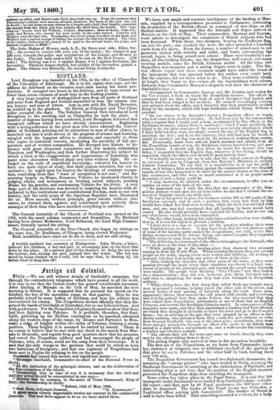SCOTLAND.
Lord Brougham was installed on the 18th, in the office of Chancellor of the University of Edinburgh. He is in his eighty-first year, yet the address he delivered on the occasion must rank among his finest pro- ductions. It occupied two hours in the delivery, and in type covers no fewer than even columns of small type in the leading journal.
A very large number of distinguished men from all parts of Scotland and some from England and Ireland assembled to hear the veteran ora- tor, lawyer and man of letters. Arm in arm with Sir David Brewster, be walked up to the platform. Sir David, as Principal and Vice Chan- cellor occupied the chair. The Solicitor General then introduced Lord Brougham to the meeting, and as Chancellor he took the chair. A number of degrees having been conferred, Lord Brougham delivered that inaugural address which we have already characterized. Beginning with a loving reference to the great men who have adorned the Univer- sities of Scotland, pointing out its attractions to men of other climes, he launched out into a wide survey of the progress of science and learning, mingled with the happiest advice to students, and especially to those who aspire to oratorical renown, inculcating the necessity of full pre- paration and of written composition. He diverged into history to de- nounce with great eloquence conquerors and war makers, contrasting Napoleon and Washington, and then further illustrating his subject he struck a blow at the exaggerations and suppressions of historians, who paint some characters without shade and some without light. He en- larged on the evils of superficial knowledge, exhorted his hearers to have one main object of study, that shall engross attention but not be exclusive ; he urged upon his hearers the blessings of constant occupa- tion, reminding them that "want of occupation is not rest; " and dis- coursing largely on Hume, Rousseau, Voltaire, he inculcated charity in judging others, and seriousness in treating sacred subjects, praising idnme for his gravity, and condemning Voltaire for his levity. A very large part of his discourse was devoted to inspiring his hearers with at- tachment to free institutions and constitutional freedom, such as our own history, and the early years of the American Republic have illustrated for us. Mere success, without principle, great talents without cha- racter, he warned them against, and condemned most severely those scourges of their time who have sacrified everything to ambition.
The General Assembly of the Church of Scotland was opened on the 17th, with the usual solemn ceremonies and formalities. Dr. Maitland having been chosen Moderator, Lord Belhaven, the Lord High Commis- sioner, formally opened the sitting.
The General Assembly of the Free Church also began its sittings on the same day, Dr. Buchanan, of Glasgow, being elected Moderator. Both Assemblies have since sat de die in diem, and are still sitting.
A terrible incident has occurred at Blairgowrie. John Heron, a baker. induced his ;children, a boy and girl, to accompany him up the river that flows by the place. At a narrow part of the channel, he flung the boy into the torrent, and, seizing the girl, jumped into the water. The boy was saved by being washed on to a rock, but he says that, in floating by, his father tried to drag him off!


























 Previous page
Previous page